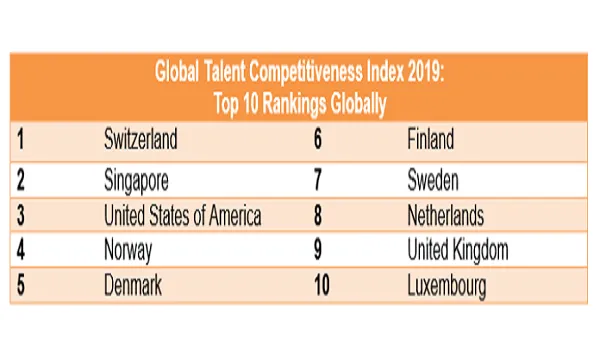
Singapore still trails Switzerland in talent competitiveness
The Lion City ranked 26th in its ability to retain skilled workers.
Singapore retained its leading position in Asia Pacific (APAC) in talent competitiveness due to its strong education sector for the sixth consecutive year, according to the 2019 Global Talent Competitiveness Index (GTCI).
Globally, it came in second after Switzerland, which also held on to its crown as the most talent competitive country in 2019 thanks to its strong performance across all six pillars of the GTCI model. Trailing behind Singapore were US, Norway, Denmark, Finland, Sweden, Netherland, UK and Luxembourg.
Singapore ranked highly in three of the six pillars, comprising Enable, Attract, and Global Knowledge Skills. It was also one of the strongest performers with respect to the pillar on vocational and technical skills.
Also read: Here's why Singapore can't be the best country in attracting talent
According to Bruno Lanvin, executive director of global indices at INSEAD and co-editor of the report, it comes as no surprise that Singapore is the leader in Global Knowledge Skills, which is the pillar that best reflects entrepreneurial talent.
“Compared to its competitors in the region, Singapore’s stellar performance shines through. In fact, it is no less than 10 places ahead of the second-best competitor in the region, New Zealand,” he said.
However, the city-country’s lowest pillar rank in Retain (26th) signified its relative weakness in retaining talent with room for improvement with regards to the workforce contributing to pension system (42nd) and social protection (38th) subcomponents. The Lion City also ranked low on workforce with secondary education and population with secondary education (69th in both cases).
In the 2019 GTCI, six Asia-Pacific countries rank in the top 30, including New Zealand (11th), Australia (12th), Japan (22nd), Malaysia (27th) and South Korea (30th).
Produced in partnership with The Adecco Group and Tata Communications, the GTCI is an annual benchmarking report that measures the ability of 125 countries to compete for talent by identifying the ways in which companies, countries, and cities can foster entrepreneurial talent that make up a critical component of competitiveness and innovation.



![SBR 5 Lorem Ipsum News 2 [8 May]](https://cmg-qa.s3.ap-southeast-1.amazonaws.com/s3fs-public/styles/exclusive_featured_article/public/2025-05/a_hand_pointing_to_a_futuristic_technology_5b87c9d0e3_3.png.webp?itok=M3Hf-9XR)
![SBR 4 Lorem Ipsum [8 May Top Stories]](https://cmg-qa.s3.ap-southeast-1.amazonaws.com/s3fs-public/styles/exclusive_featured_article/public/2025-05/a_hand_pointing_to_a_futuristic_technology_5b87c9d0e3_2.png.webp?itok=2m5Wl0MX)


![Exclusive three SBR 12 Lorem Ipsum [8 May]](https://cmg-qa.s3.ap-southeast-1.amazonaws.com/s3fs-public/styles/exclusive_featured_article/public/2025-05/a_hand_pointing_to_a_futuristic_technology_5b87c9d0e3_11.png.webp?itok=8kn_UIfA)
![SBR 3 Lorem Ipsum [ Exclusive 2]](https://cmg-qa.s3.ap-southeast-1.amazonaws.com/s3fs-public/styles/exclusive_featured_article/public/2025-05/a_hand_pointing_to_a_futuristic_technology_5b87c9d0e3_1.png.webp?itok=YCyjLegJ)
![SBR 2 Lorem Ipsum [8 May]](https://cmg-qa.s3.ap-southeast-1.amazonaws.com/s3fs-public/styles/exclusive_featured_article/public/2025-05/a_hand_pointing_to_a_futuristic_technology_5b87c9d0e3_0.png.webp?itok=_cKD-29o)

![Video [Event News]](https://cmg-qa.s3.ap-southeast-1.amazonaws.com/s3fs-public/styles/event_news_featured_article/public/2025-05/screenshot-2025-05-08-at-4.58.53-pm_0.png.webp?itok=Kud35sMs)
![Event News SBR 9 Lorem Ipsum [8 may]](https://cmg-qa.s3.ap-southeast-1.amazonaws.com/s3fs-public/styles/event_news_thumbnail/public/2025-05/a_hand_pointing_to_a_futuristic_technology_5b87c9d0e3_8.png.webp?itok=DTh_dbYp)
![Event News SBR 9 Lorem Ipsum [8 May]](https://cmg-qa.s3.ap-southeast-1.amazonaws.com/s3fs-public/styles/event_news_thumbnail/public/2025-05/a_hand_pointing_to_a_futuristic_technology_5b87c9d0e3_7.png.webp?itok=vzDAzb6V)
![Event News SBR 8 Lorem Ipsum [8 May]](https://cmg-qa.s3.ap-southeast-1.amazonaws.com/s3fs-public/styles/event_news_thumbnail/public/2025-05/a_hand_pointing_to_a_futuristic_technology_5b87c9d0e3_6.png.webp?itok=jvHFc4P6)
![Video [Event News]](https://cmg-qa.s3.ap-southeast-1.amazonaws.com/s3fs-public/styles/video_thumbnail/public/2025-05/screenshot-2025-05-08-at-4.58.53-pm_0.png.webp?itok=yZnI0YBb)
![Video 1 SBR [8 May]](https://cmg-qa.s3.ap-southeast-1.amazonaws.com/s3fs-public/styles/video_thumbnail/public/2025-05/screenshot-2025-05-08-at-4.58.53-pm.png.webp?itok=9AAeRz_k)

 Advertise
Advertise

